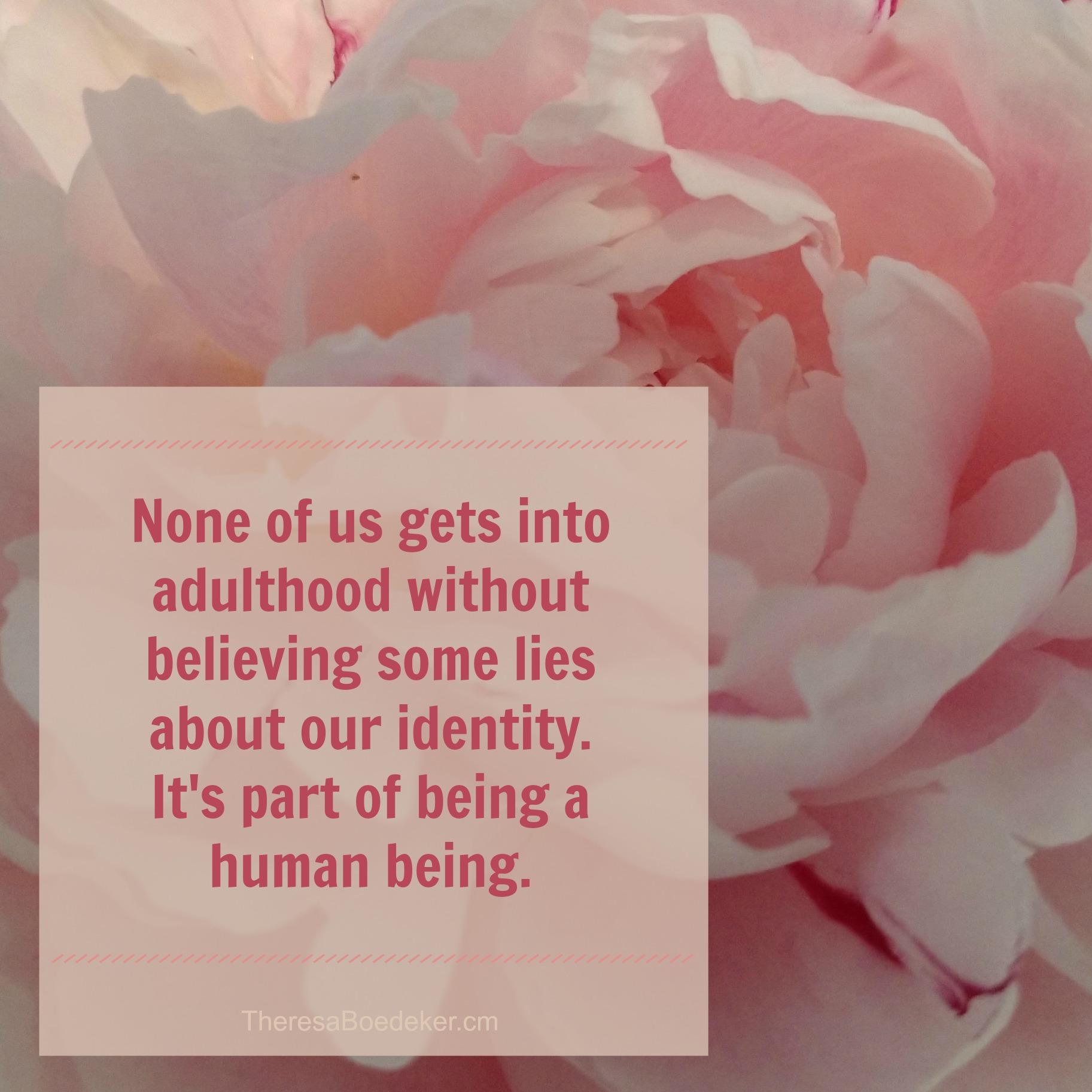Once we feel the emotions of shame, what causes us to misinterpret the event and believe a lie about our identity? Here are 12 perfectly normal reasons we blame our self. Hint: we are trying to make sense of what’s happening. This is post 6 in a series on shame.
We as humans try and make sense of things.
What’s happening to us. Around us. In our world.
And why is it happening.
We want to know the 5 W’s and 1 H. Who, what, when where, why, and how.
To solve problems. Avoid problems. Predict the future. And make sense of people and events.
It’s all normal and part of being a human.
We want life to make sense.
We don’t like unanswered questions in our life.
So, when we have unanswered questions, we often fill in the answers using our own experience and knowledge.
Sometimes we are right. And sometimes we are wrong.

How trying to interpret our life can get us in trouble.
This desire to make sense of the world and what is happening to us and why it is happening, can get us in trouble.
Especially when we misinterpret things.
Jump to conclusions.
View life only through our own lenses.
Or think we are to blame when we are not.
This happens when we misinterpret events or words and tie them to our identity. And then believe those misinterpreted lies about our identity.
A classic example is a child believing that somehow, she is at fault and part of the reason her parents are getting a divorce. Maybe if she had been an easier child. If she had not argued with her siblings so much. If . . . (fill in the blank).
Whatever the child believes, or comes to believe, is a lie. A lie of shame because it affects and distorts her identity and it is a secret she keeps. Not sharing it because then others would know that she was responsible. Maybe not love her if they only knew the truth.
It may be years later that the now adult realizes the truth. That she was not responsible for her parent’s divorce. It was their choice. Nothing she could or couldn’t have done would have affected their decision.
But still, that lie she believed so many years ago, has impacted her and her identity over the years and caused her to think she was responsible for other things she was not.

All of us have believed lies about our identity.
None of us gets into adulthood without believing lies about our identity and our self. It’s part of being a human being.
The problem is when we believe these lies about our identity, we often feel shame around these false truths about our self. What I call, lies of shame.
Lies of shame, come from us misinterpreting an event or words and tying them into our identity. Thinking they are saying something bad about us as a person.
We feel the emotions of shame from an incident or words said to us (even words we say to our self), and we interpret them as saying something is defective about our identity.
Remember feelings of shame are just feeling and emotions, just like happiness, anger, or fear. They are neither good or bad; they are just trying to tell us something.
We don’t like the feelings we are experiencing, and we search for a cause, a reason, and may interpret it as something is defective with us (often based upon past experiences, words, or core beliefs).
Poof, we have planted a lie of shame that distorts our identity. A lie we often keep validating and believing if the truth is not used to stamp on and discredit the lie.
A key component of shame is misinterpretation of words and events. Let’s look at how or why we come to believe lies about our identity.

What causes us to believe the lies of shame that affect our identity?
Here are 12 perfectly normal reasons that cause us to misinterpret events and words and believe the lies of shame that distort our identity:
1. Age and experience. We often make sense of things with an explanation that makes sense to us at the time. Few of us in our younger days had the tools to deal with shame. Neither did we have much life experience and perspective.
A young mother may think her newborn’s crying and crying the first few weeks of life means she is a bad mother; something is wrong with her. A mother of 8 kids may think the infant is colicky. Each are making sense of the situation but from different levels of experience.
2. Looking inward. When we feel shame, we want to hide and not talk about it. Often, we look inward. Think something is wrong with us. That it is our fault because something is wrong with us. We could have done something different and changed the outcome if only we were not so defective. (Do you see the lies here affecting our identity?)
Shame tells we are responsible. That we have enough control over others and situations that we could have avoided the whole thing.
One of the big lies about shame is that “you could have prevented the whole thing if you had . . . . and because you didn’t, it’s your fault. All of it.”
Remember: shame is not about WHAT WE DO, it’s about WHO WE ARE. It’s a condemnation of who you are. Lies about our identity are at the root of shame.
3. Judging ourselves. When we believe shame’s lies, we unknowingly take the fall. Often, we are not the ones at fault, but we judge ourselves, find us lacking, and jump to the conclusion that something is wrong with us.
I don’t want to be harsh here, because often we are just buying into messages that have been told to us, or we think experience has confirmed. If an adult in power is telling us “we are a mistake,” as a child we have no reason not to believe them. We know they must be right, so that means something is wrong with us.
Comparing and judging ourselves against others also fosters lies about our identity. Looking through social media may cause us to think everyone has their life together but us.
4. Core beliefs. The basic beliefs we hold about our self, others, and the world make up our core beliefs. They are our absolute truths and determine how we interpret the world.
If shame’s lies about our identity become part of our core beliefs, then we will keep believing the lies about our identity until we change our core belief. If one of our core beliefs is that we think we are not good enough, then we will interpret the world through this lens and find confirmation over and over again. This is why the lies of shame that affect our identity bleed over into many aspects of our life.
5. Not tuning into our feelings. Avoidance. When we don’t listen to our emotions and deal with the feelings of shame we initially experience, they grow. Sometimes to relieve our pain and their intensity, we declare our identity defective and then more on. Never dealing with the emotions at all.
Remember, there is nothing wrong with feeling the emotions of shame. They are just emotions/ feelings, neither good or bad, just part of being a human being. Uncomfortable emotions are just trying to tell us something is wrong or needs dealing with.
6. Feeling we can’t ask for help and must solve it on our own. When we think we need to solve our own problems, not ask for help but have it all together, we become isolated. This leads to secrecy, hiding, and not living in community. All things that foster the lies of shame we believe about our identity.
How many of us don’t ask for help or share our burdens because we feel this would make us weak? Then we have bought into one of the lies of shame, that we need to be strong and solve things by our self.

7. Feeling we are all alone. The lies of shame want us to think we are the only one who has felt this way. Been humiliated in this manner. Had this happen to them. Feeling all alone isolates us from help. From empathy. From love. From feeling connected with others. And often from God.
This is one of the biggest lies of shame. “You are all alone. No one understands. And if people (or God) found out, they would withdraw their love.”
8. Thinking we have more control than we do. The lies of shame tell us that if we hadn’t done this, or were not this way, then the event that is causing us to feel the emotions of shame would not have happened.
We may tie our behavior into being able to influence or control the other person or the event. If we are being yelled at for burning the apple pie, we may think that if only we were a better cook, then we could have eliminated the person yelling at us.
Reality is, we can only control our own behavior. We cannot control other people or their behavior.
9. Labeling our self for our actions. Labeling our self a bad person. Not that we did something bad, something embarrassing, or where just in the wrong place at the wrong time. There is a big difference between the two. One involves your whole identity, the other involves an action.
If your boss calls you out in front of your co-workers for failing to get your report to him on time and for making three typos within the report, this does not make you a bad person. It does not involve your whole identity. It makes you human and prone to mistakes. It does not rewrite your identity.
You may be feeling the emotions of shame for being called out in front of your peers, but it is the boss who is doing something wrong and overstepping healthy boundaries. Not you.
When shame involves us and another person, often the shame we are feeling is not because we did something wrong, it is because the other person is acting inappropriately, overstepping boundaries, or is doing something wrong to us. The person who is shaming us may be telling us it is our fault, when they really are at fault and trying to pass the blame.
10. Silence. Keeping silent about our emotions and the event and not talking about them. When we don’t talk about what is shaming us, getting outside perspective, wisdom, help in interpreting the event and words, and empathy, shame thrives.
Instead of getting outside help and perspective, we rationalize the situation and come to our own conclusions, which are often wrong. “The teacher wouldn’t pick on me if I was just a better student.” (Another way of saying, “I deserve this.”)
Talking about our feelings of shame and what is causing it takes vulnerability and courage. Because the lies of shame are telling us at all costs, not to do this. That talking about it will cause us more shame and humiliation and people to judge us even worse.
Brene Brown, a researcher on shame and vulnerability, says shame thrives on silence, secrecy, and judgement. These can come from ourselves or others.
11. Not extending grace and forgiveness to our self. This ties into judging ourselves harshly. We are often quick to extend grace to others. “No, it’s all right if you are late for dinner. Life happens,” we tell our friend. But when we are late, we may not extend that grace to our self.
12. Not believing our true identity in God. That we are his treasure. His beloved. That we can do nothing to make him love us more. And nothing to make him love us less. That he gets to choose our identity. Not us.

Don’t feel one iota of shame for falling for these tricks of shame.
The last thing I want you to feel is shame. Or to feel bad for getting tricked by these lies that shame whispers to us concerning our identity.
We have all fell for these lies.
It’s part of being human.
It’s part of life and learning.
We should not feel shame for believing the lies of shame. It makes us neither a good or bad person. We are all a work in process and learning as we go.
Learning to replace lies with truth. It’s just a normal part of living and breathing and being human.
God doesn’t condemn you. He loves you.
Our enemy is the master liar and wants us to believe lies about our identity.
But God does not.
He does NOT want you to believe the insidious lies that shame wants us to believe concerning our identity. Because they are not true.
We can make steps to correct those lies.
To smash the lies with truth. God’s truth.
God wants us walking in freedom.
Placing our identity in him.
Let’s choose truth. His truth about our identity.
Next post in this series will define guilt and shame and the difference between the two.

Check out this resource that covers everything you need to know about shame, including frequently asked questions.
Or take the Shame Quiz and begin to identify how shame is distorting your identity and worth. Once we know the lies that shame is wanting us to believe, we can more easily crush them with the truth.
Thanks for stopping by. Keep remembering what’s important.
Theresa
Download a free guided exercise to help you heal from shame
Download a free PDF freebie, “What to Do When You Are Feeling Shame: A Guided Exercise.” It will walk you through some practical exercises to deal with shame. Ending with how to avoid feeling shame in the future. My passion is to see you living shame-free; in glorious freedom. “What to Do When You Are Feeling Shame: A Guided Exercise” can help you step towards that freedom by breaking the lies of shame you believe and replacing those lies with the truth.
From Shame to Grace: How to Erase Shame From our Identities, a 12-part series. — Other posts in this series on shame include:
We Are Not Meant to Live in Shame
There is No Shame in Feeling Shame
How the Lies of Shame Cause Us to Think We Are the Defective Ones
Environments Where Shame Thrives
The Symptoms of Shame and the 4 Ways It Makes You Feel
12 Ways That Misinterpreting Events Causes Shame
Shame Versus Guilt: What’s the Big Difference?
Combat Shame by Knowing Your True Identity
Why We Use Shame on Others and Ourselves: 6 Eye Opening Reasons
Shame: Recognize It, Heal From It, Walk in Freedom
What if Shame Has a Bigger Purpose Than Us?
Spiritual Shame: What It Is and How to Conquer It
Join the discussion: What causes you to believe lies about your identity?

May link up at Kelly Balarie (#purposeful faith), Crystal Storms (#HeartEncouragement), Maree Dee (#Grace & Truth), Anita Ojeda (#inspirememonday), InstaEncouagements ((IE Link-Up), and Mary Geison (#tellhisstory).

- How Knowing Your Husband Can Impact Him for Good - March 24, 2022
- How to Stop Focusing on What’s Wrong with You - March 9, 2022
- Is God Really Good All the Time? - February 24, 2022
Theresa, this series on shame has been so good for me to read. Thank you from the bottom of my heart. God does not want us to live in shame, He wants us to live a life of freedom and grace. I am especially paying attention to your #6 on the list. I often feel as though I must solve every problem on my own. It’s good to read this reminder that I have community and prayer to support me.
I am with you there, Laurie, on #6. Part of it is being a problem solver as a momma, but the other part is buying into this lie. Asking for help is often one of my last resorts. Even with God. When sometimes it needs to be my first response. I am learning that others are there for me, just like I am there for them. Sharing our burdens is a lighter way to live.
I think that understanding how it happened can lead to undoing the shame. I’m continuing to learn and heal a little each week on this journey with you. Thank you
Yes, Valerie, we can undo shame by understanding how It happened. So glad to be on this journey with you.
I’m pretty sure I have experienced all twelve of these beliefs/lies about myself at some point in my life. One of the things I have been able to work on and grow in is who I am in Christ. I didn’t grow up in a church that focused much on this. I’m blessed to be able to know now that God chose me and He created me in HIs image.
Me too, Mary. I have fallen for all 12 of these tactics. But God is so gracious and allows us to grow and learn and replace lies with truth. What grace he gives us. When we know our true identity, it is harder to fall for these tactics and lies. So glad you now know God’s truth about your identity.
This is SOOO good, Theresa! Did you ever read the kid’s classic The Phantom Tollbooth? Milo, the main character, learns how easy it is to jump to the Isle of Conclusions and the fear of getting off the island. All too often we jump to the same island and get ourselves all tangled up in lies when in reality, it’s easy to get off. I’m pretty good at avoiding my feelings and I’ve discovered that journaling really helps me face and process them.
That book is so good, Anita. It was my son’s favorite book for a few years. And my daughter read it many times. Yes, it easy to jump to the Isle of Conclusions and get tangled up in lies. It seems there are many ways to avoid our feelings, I know from first hand experience, when we would save time and stress by just dealing with them. Trying to learn this.
I can relate to several of these. Not a good sign, huh? Thanks for this series, Theresa! It’s been a good one!
Theresa, so much of what you offer here is what I’m going through with my teen daughter right now…I know that shame was some of my hardest work, and I couldn’t do that work ’til I hit 40. Thanks to God, I did it before she hit this very dark, troubling place. It’s scary as all get out to be in it with my dear girl, but I am so grateful that I’ve got some footing on the other side so that I don’t have to shame myself for HER shame…it really can stack up. I never had the gift of this kind of work as an adolescent; I’m not sure what the results will be, but we’re in it. Blessings and gratitude.
Yes, shame can stack up, Carolyn, and we can shame ourselves for our children’s, mate’s, or other person’s shame. She is blessed to have you by her side as you know there is freedom on the other side and a life where shame no loner defines you. I will be praying for your daughter and her work as she moves towards healing. And wisdom for you to know how best to help and support her. Think how far ahead she will be dealing with it now, and how she will be able to use this experience to help other people in the future. Jesus dies not only to wash away our sins, but also to take away our shame. In him we have a new identity. One without shame. Praying your daughter realizes this as she comes to see her new identity and God’s love for her.
I guess it just shows you are a normal human, Lisa. I don’t know anyone who doesn’t relate to some of these. These are just flawed ways we make sense of the world.
This really describes much of my life, Theresa. 🙁 I’m so grateful God has helped me to heal more from abuse and continues to help me to more and more replace those lies with His truth and who I really am in Him. But sometimes it can still become such a struggle. When my body and mind are so fatigued, Satan especially knows how vulnerable I am to believe those lies he pierces me with. Then it can be so hard to focus on the truth. This line brings tears to my eyes – “We should not feel shame for believing the lies of shame. It makes us neither a good or bad person. We are all a work in process and learning as we go.” Thank you so much for this reminder. A verse God often reminds me of is Romans 8:1. No condemnation in Christ! Love and blessings to you!
Judy, so glad that God is helping you heal from lies and shame. His truth really can set us fee. It’s not easy to replace lies, but God isn’t asking for perfection or instant success, he is asking for progress. Small steps really do add up to big steps over time. I remember reading just one chapter aloud to my son each day, and within months we had read 5 or 6 books. When I started it didn’t seems like we would cover so much ground, but we did. So keep up those small steps. I am cheering for your progress, and so is God. Each time we replace a lie with truth the enemy loses ground. Romans 8:1 is one of my favorite verses too.
Theresa, we are GREAT at misinterpreting! I especially like your point about thinking we can handle it on our own—we can’t! God knows this, and deep down we know it too. But sometimes we have a memory lapse and think “I got this!” We don’t! But God does! Thank you for these reminders!
Pinned.
Thank you for linking up at InstaEncouragements!
Yes, Patsy. I think we often want to think we can handle it on our own. And sometimes we think we should handle it on our own and can or should make some improvement on it before we turn it over to God; then he will know we are serious. At least sometimes this is how my reasoning goes. Once again a way of misinterpreting the event. 🙂